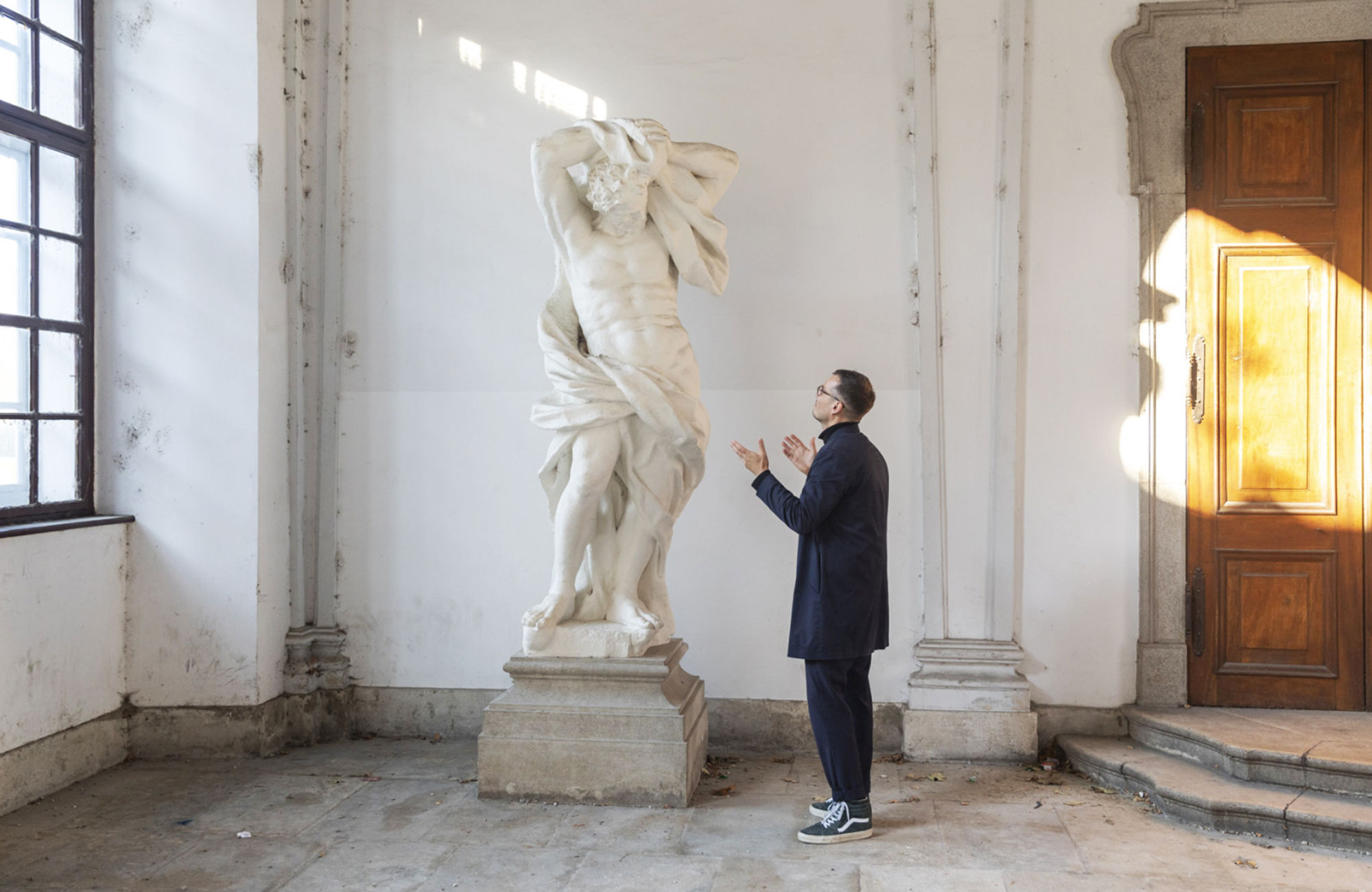Bust Talks is an ongoing performance series based on the assumption that busts and statues are not soulless objects, but potential interlocutors whose experiences and views can unfold a new perspective on our present. My dialogue partners included historical and controversial personalities such as Hans Klöpfer, Josef Werndl, Friedrich W. Raiffeisen and Rudolf Steiner or mystical figures such as Sphinx, Atlas or Illumina.
Read more with a text by Mirela Baciak.

Atlas
In architecture, the Atlas statue is a larger-than-life male "bearer" of a load-bearing architectural element, so named for the Titan of Greek mythology, who had to carry the vault of heaven. My interlocutor was deprived of his actual function and placed in a dark corridor in the lower Belvedere. What does this de-functionalization do to someone who was used to constantly showing off his strength and resilience?
– Commissioned & produced by Belvedere, 2023; photo by

Sphinx
Drawing on Egyptian and Greek mythology, the revived Mannerist sphinx of the late 15th century became a fixture of decorative outdoor sculpture in 18th-century palace gardens. There are more than 20 of them in the gardens of the Upper Belvedere in Vienna. In the course of our conversation, surprisingly, it turns out that they are not decoration at all, but a collective of artists.
– Commissioned & produced by Belvedere, 2023; photo by

Rudolf Steiner
Rudolf Steiner, the founder of anthroposophical philosophy, is definitely an elusive figure, revered by some, despised by others. His work vacillates between philanthropy, elitism, and even racism.
– Commissioned & produced by Belvedere, 2023; photo by

Alexander Ecker
The bust of scientist Alexander Ecker was taken down some years ago, because of his scientific involvement in colonialism. Alexander Ecker not only made an intellectual contribution to racial theory, but also amassed an extensive skull collection, which is still stored inaccessibly in Freiburg. Some of the skulls demonstrably originate from a context of injustice, for example from the concentration camps of the former colonies. Howeber, the ghost of Alexander Ecker ist still present and looks rather relaxed at this conflict and is all the more enthusiastic about our present scientific abilities.
– Museum für Neue Kunst, Freiburg, 2022; photo by

Die Ausschauende
A conversation with an anti-war memorial that ostensibly commemorates the war widows of World War II. The conversation revolves around the theme of mourning and the dubious privilege of female statues to publicly represent mourning.
– Commissioned & produced by Kunstverein Siegen, 2023; photo by

Illumina
In 2014, the so-called Illumina statue was damaged by unknown persons and remains in this condition today. Since then, the statue has been missing its head; the Illumina has become ‘the decapitated’. In preparation for the discussion, possible answers of the statue to the artist's questions were found in collaboration with a group of people from Freiburg: Birgit Heidtke (Feminist history-werkstatt), Sévérine Kpoti (HereandBlack), Oliver Matthes (FREIeBÜRGER) and Dieter Roeschmann (Municipal Comission Art in public Space).
– Commissioned & produced by Biennale für Freiburg, 2021

Hans Klöpfer
Hans Kloepfer was a doctor and local poet and is still an important identity figure in Styria today. But he was also a convinced National Socialist and that from the first hour. Nevertheless, a bust of him stands on the Schlossberg in Graz, among other places.
– Commissioned & produced by steirischerherbst, 2019; photo by

Kifwebe
A conversation with an East African Songye mask that has been in the possession of Kunsthalle Emden for several years. As a matter of fact, the provenance of the mask is unclear.
– Commissioned & produced by Kunsthalle Emden, 2019

Mutter
This conversation took place with an anonymous woman sitting on the grave of Johann Jakob Bachofen. Bachofen is the author of The Mother‘s Right a controversial book about how an early matriarchy evolved into a culturally superior patriarchy. Our conversation is not only about Bachofen, but mostly about the appearance and use of allegories within statutes.
– Commissioned & produced by Ausstellungsraum Klingental, 2021

Ludwig van Beethoven
Ludwig van Beethoven is known as a great composer. But he also had a keen interest in economics and was concerned a fair payment. The conversation with Beethoven not only revolves around these economic questions, but also leads to the idealistic value of artistic work to society.
– Commissioned & produced by Wiener Festwochen, 2021; photo by Franzi Kreis